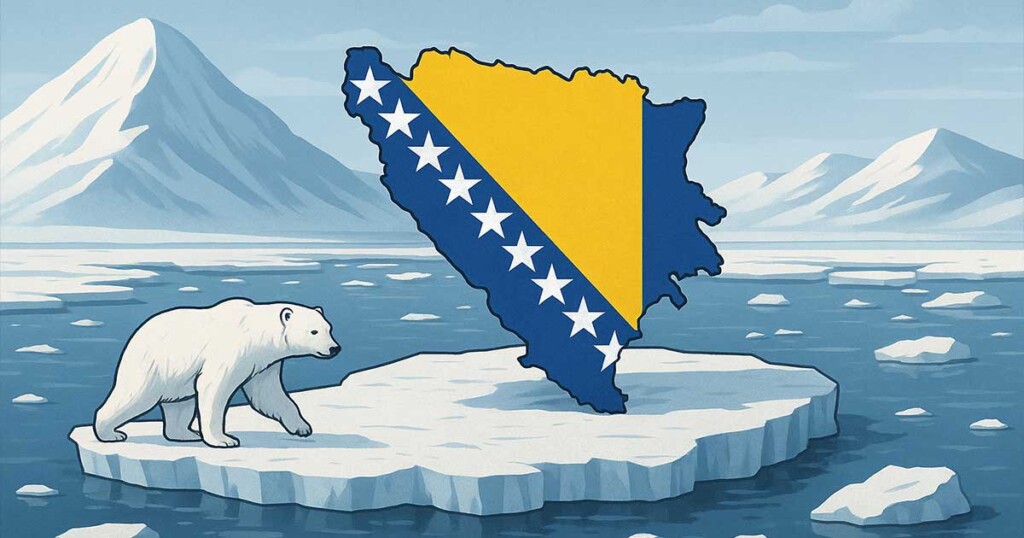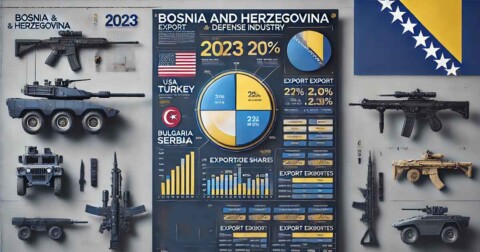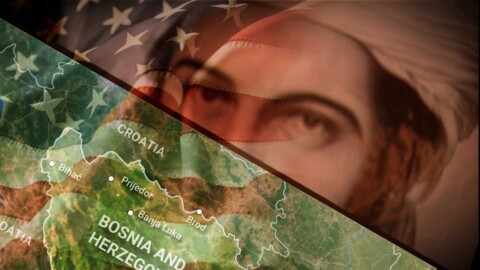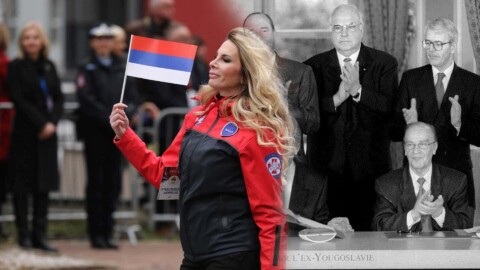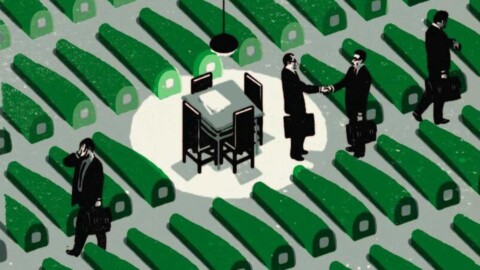Let us go back to the late ’80s and early ’90s, that is, to the first multi-party elections. The communist practice of sweeping under the rug all truths undesirable to the regime about the relations among the three constituent peoples surfaced during those first free elections. In numerous pre-election media polls of public opinion, everyone claimed they would vote for the communists or reformists, yet national parties received 80% of the votes. In Sarajevo, the capital and largest city with a multiethnic composition, mirroring the national structure of the entire Bosnia and Herzegovina, national parties won in all ten municipalities individually. SDA (Muslim party of Democratic Action), SDS (Serb Democratic Party), and HDZ (Croatian Democratic Union) received a number of votes proportional to their share in the national composition of the republic. That is why it was said that these were not really elections, but rather a national census of the population.
GENERAL MODEL OF POLITICAL BEHAVIOR IN BOSNIA AND HERZEGOVINA
But why did people mostly hide their true political orientations, why did they lie? In surveys, they could have said that they had not yet decided, that they would abstain, that they would entrust their choice to the ballot box at the polling station, or simply refuse the interviewers, or something similar. Bosnian ketman? The phenomenon of ketman, which De Gobineau discovered in the Oriental world and which was linked to Islamic tradition, turned out not to be foreign to Bosnian-Herzegovinian Catholics and Orthodox either, but rather a general model of political behavior in BiH. The Polish-French writer and dissident Czesław Miłosz brought us closer, both geographically and ideologically, to the meaning of ketman, recognizing it in socialism as well. Ketman as a general form of political behavior boils down to actively supporting that with which one does not agree. Unlike the political conformist, who passively follows political directives and quietly adapts or loudly confirms them (such as a “takoyevich” or an “evet efendi”), while keeping his reservations to himself, ketman very actively—even passionately, intrusively, and aggressively—demonstrates loyalty to the domestic or occupying regime. He propagates, agitates, applauds, chants, while keeping resistance “in the depths of his soul,” until the right moment comes. Moreover, the stronger that inner resistance is, the stronger the manifestations of loyalty become.
The direct experience of the author of this text testifies that Sarajevo Muslims in wartime Sarajevo, who were perceived by their surroundings as restrained nationalists, with post-communist freedom remained moderate nationalists, while many party activists overnight transformed into extreme nationalists and chauvinists. But ketman, however morally questionable it may be, is primarily the fault of the system that forces people to hide their political beliefs, or rather requires courage to express them if they are undesirable. In ethnically cleaner villages, there were no such complexes, and they addressed each other as Turks, Vlachs, Latins (shkutors, Shokci), while in ethnically mixed towns one learned from an early age: there were always stories that were only “for at home,” because they were not suitable “for in front of others.” And it did not even have to be anything offensive, but merely a warning that others are different and might misunderstand.
FOR A TRANSFER INTO NATIONAL PARTIES, A BIRTH CERTIFICATE WAS ENOUGH, BUT STILL…
It was not only that everyone lied before the elections—they continued doing so even after the results had already been announced. If the first case can be explained, the second is harder to understand. The handover of power took place without resistance from the ruling Communist Party, while the three victorious national parties, already bound by an informal pre-election coalition, had beforehand agreed on the division of positions. Everything was carried out smoothly and quickly, without revenge or lustration. The defeated communists and reformists were an insignificant force, and many of them joined the winners. For a transfer into the national parties, it was enough to show a birth certificate. Therefore, there was no longer any reason to fear the restoration of the old regime or accountability for betraying unity and coexistence. Why, then, did they still feel the need to continue lying that they had voted for the communists and reformists? Was it shame before themselves for such a sudden ideological flip, or moral discomfort before neighbors of another nationality, before whom they had pretended hypocritically for decades?

DISASTROUSLY LOW CAPITAL OF MUTUAL TRUST
Finally, in the next phase, when democracy had already brought Bosnia and Herzegovina to the brink of civil war and disillusionment with the new order, more rational analyses emerged about what happened with all those supposed “communists.” After several campaigns of mass party enrollment, almost every adult employed man in BiH was a member of the Central Committee, practically as if he were also a member of his building’s tenants’ council. Or at least there were almost more with party membership cards than without. Many justified themselves mutually by saying they feared that the others would vote for their national parties, so they would again end up being the naive ones. That collective self-criticism, a typical Bosnian compromise in which all three sides discredit themselves, was actually testimony to a disastrously low capital of mutual trust, even after 45 years of “brotherhood and unity,” coexistence, and solidarity. The ratio of 80 to 20 in voting percentages could be translated into the ratio of distrust and trust, and with such a meager capital of mutual trust it is not possible to build a society, let alone a state. Suspicion and caution have deep historical roots, going back to the Ottoman and Austro-Hungarian occupations and the world wars, during which the three peoples were never on the same side.
In the last decades of socialism, this was manifested in three-sided perceptions that the other two were more connected, more united, more solidary—of course, to the detriment of the third. It was said that agreements were made at Muslim family gatherings, at Serbian patron saint celebrations, after Mass in the cathedral, and then carried out with discipline. On those occasions, “among one’s own,” conversations were more open, but no conspiracies were plotted against the others. Still, it was enough to generate new doses of distrust.
The capital of trust as a factor of social integration has been mentioned since the 18th century, and it was taken as the foundation for the flourishing of the NGO sector in contemporary politics, which later perverted into an instrument of external manipulation. Authentic social capital of trust is based on informal contacts (friends from the neighborhood, sports fans, neighbors, hunters, drinkers, pensioners) and the spontaneous networking of people around specific affinities, beyond national, religious, or party identities. There really were people in BiH of all nationalities who identified more as Sarajevans, Mostarians, supporters of KK Bosna or FK Velež, even when such overlapping identities had almost disappeared. For 80 percent of Bosnians, national identity pushed aside all others.
THE PRISONER CIRCLE AS THE MAIN GENERATOR OF DISTRUST
Izetbegović and his prisoner circle, which formed the inner core of power within the SDA, became in the short peacetime interlude between the elections and the war a new generator of national distrust. Numerous agreements they entered into with the Serbian side—only to withdraw from them at the last moment without explanation or to violate them (the Belgrade Agreement, the Ohrid Agreement, the Cutileiro Plan, the Council for National Equality)—led to a point where nothing they said could be trusted anymore, evoking the old Serbian saying: “No one can lie like a Turk!” Many Muslim politicians (Nijaz Duraković, for example), pro-Bosnian Serbian authors (such as Gojko Berić), and his Catholic interlocutors (such as Friar Petar Anđelović) wrote, without exaggeration, about his almost pathological mendacity.
Karadžić, himself a psychiatrist, unsuccessfully inquired with Belgrade orientalists whether some explanation might be found in Islamic culture. One of our two explanations… Aliya’s circle was made up of Omer Behmen, Hasan Čengić, Ismet Kasumagić, Džemaludin Latić, and other Young Muslim underground activists, conspirators, and plotters who, even outside the prisons of Zenica and Foča, lived under the watchful eye of the UDBA, surrounded by numerous informants. For instance, a carefully vetted printer from Baščaršija who reproduced the Islamic Declaration sheet by sheet on a mimeograph delivered one copy the same day to the political police.
Izetbegović did not hide his general contempt for Islamic clerics, many of whom secretly worked for the communist authorities. As Duraković writes, Aliya trusted no one except them—his prison comrades, tested both in the Sarajevo trial and during their incarceration. He especially distrusted kaurs—Orthodox and Catholics—as well as communist atheists and even the Christian partners in the post-communist SDA–SDS–HDZ coalition government, toward whom he applied deceit and duplicity as legitimate methods of political struggle. He would naively yet slyly justify himself: In the morning it seems to me one way, in the afternoon another.
With this zero level of trust—or rather complete distrust—crowned by outvoting in the joint Assembly and the referendum carried out against the will of the Serbian people, the beginning of civil war on national and religious grounds was sealed.
LYING AND DUPLICITY – A LIGHT VERSION OF FATWA AND ISLAMIC TERRORISM
The second explanation for the behavior of Aliya’s circle, which destroyed the already limited pre-war capital of national trust, was the fact that it consisted of a group of Islamic fanatics who believed that the struggle for the re-Islamization of Muslims and the Islamization of others in Bosnia and Herzegovina, until the establishment of a Sharia-based state, represented an exalted, God-pleasing goal that justified all means. Laws, moral norms, contracts, promises, and any worldly obligations ranked lower compared to what Allah, exalted be He, and Muhammad the Prophet expected of them: to spread and strengthen the Islamic faith, which included creating a Sharia state as part of the Muslim ummah from Morocco to Indonesia. Lying and duplicity were a light version of fatwa and Islamic terrorism.
The civil war, naturally, maximally increased the capital of distrust to the extent that war negotiations were not possible without foreign mediators. Moreover, when in July ’92 Carrington and Cutileiro arrived in wartime Sarajevo with their teams on a peace mission, it was Izetbegović who refused to meet with Karadžić because he was a “war criminal,” and the guests explained to him that one does not negotiate the end of war with friends but with enemies, and that they themselves would be meeting with him that same day at Sarajevo airport.
Finally, the Dayton Agreement with its annexes provided not only a cessation of war but also peace that was welcomed by the peoples on all three sides. The internal division into entities and cantons, which were territorially and ethnically homogeneous, made everyone feel relatively safe, at home on their own land within the external borders of BiH, with special ties to their mother countries. Some parts of BiH had not even been affected by the war, in some returnees were arriving, in others people were selling or exchanging real estate. The massive presence of international peacekeeping forces ensured security of movement across Bosnia and Herzegovina. Numerous state and non-governmental commissions for truth and reconciliation were formed, and an internationally sponsored casualty report was published that was balanced in relation to the pre-war national structure of the population. An international tribunal for war crimes in the former Yugoslavia was also established. All of this opened the chance for at least a minimal restoration of the capital of mutual trust, along with the sobering realization among Bosniaks that everything they gained through Holbrooke’s Dayton solution they had already had nearly signed in Cutileiro’s Lisbon Agreement—without a drop of blood being shed.
IN BOSNIA, DEMOCRACY EXCLUDES THE STATE – AND VICE VERSA
However, only a year later Richard Holbrooke, Madeleine Albright, and Hillary Clinton promoted the idea of a “return to unfinished business in Bosnia,” which practically meant revising the Dayton Agreement in the direction of reintegration of BiH, stripping the entities of their competencies, imposing laws, dismissing elected officials to the detriment of the Serbian and even the Croatian side, and in favor of the Bosniak side. They worked at a snail’s pace—boiling the frog—through shifts in tempo, pressures, blackmail, corruption, bribery, sponsorship of opposition media, opposition parties, and NGOs, all under the justification that consociation was too expensive, that constitutional changes were necessary, that the letter of Dayton should be abandoned in favor of the spirit of Dayton, and that a “Dayton Plus” was required.
What did they aim for, what kind of BiH did they want to establish? Clearly, in their minds they had the socialist BiH of brotherhood and unity, coexistence and togetherness that lasted for 45 years—but Bosnia as a liberal and democratic state. As Robert Dahl explained, “In nationally complex states, you are often faced with the choice between democracy and the state. Democracy can only survive in parts of the former state.”
Yet the effect of their actions was inversely proportional: the significant institutional changes they managed to push through only provoked growing resistance from the human material. Republika Srpska, despite everything, survived for a full 30 years, while Serbs perceive Muslim Sarajevo more as a hostile city than as their capital, and Bosniaks see all of Srpska as a temporarily occupied territory. Biden’s administration, through Ambassador Michael Murphy and the false High Representative Christian Schmidt, pressured Dodik to the limit and returned the situation to what it had been on the eve of war—conditions that had already led to war when relations among the three national communities had reached a boiling point. Yes, but as we stated at the beginning, the capital of mutual trust among the three peoples in BiH was only 20 percent even before the 1990 elections.
This explains why the communist authorities, who through the widespread DB network knew the true situation on the ground, were for decades obsessed with national relations. They droned on about the Bosnian multi-culti idyll, combined with rigorous punishment of the smallest manifestations of national identity beyond the permitted boundary—one which over time they kept raising, from brotherhood and unity, to coexistence, and then to togetherness. And in order to tighten internal ranks, they invented external enemies who, in the central republic, could not be Austrians or Greeks, but Yugoslav neighbors in Serbia and Croatia—the “motherlands” for two out of the three peoples in BiH.

REPEATING BENJAMIN KÁLLAY’S MISTAKE
National history, religion, language and script, literature and art, and other markers of identity tied the people of Bosnia more closely to Belgrade and Zagreb than to Sarajevo. At the time of Kardelj’s federating of the federation, the strengthening of the republics, and the affirmation of nations, the Socialist Republic of BiH faced the same malady that afflicted and ultimately broke apart the SFRY. Bosnian politicians accused Croatia, and especially Serbia, of “meddling” and “paternalism” toward BiH, and they persecuted Croatian—and much more often Serbian—intellectuals for collaborating with Belgrade newspapers, journals, and publishing houses whose works were read from Triglav to Đevđelija. Their only success was in driving many to move to Belgrade, and to a lesser extent, Zagreb. They repeated the same mistake as Benjamin Kállay: in attempting to create an integral Bosnian identity and patriotic sentiment, based on the Muslim people, they turned the other two peoples across the Drina and Una rivers and destabilized the Bosnian tripod, leading to the civil war of ’92.
The so-called international community is now, for the second time, resurrecting Kállay’s failed project and has been riding it for 30 years. True, at first the Europeans initiated Cutileiro’s plan for an internal territorial-ethnic division, and in Lisbon all three sides signed it—only for the Americans to send Zimmermann to Aliya to repudiate it. He took the bait, believing he could gain all of Bosnia under the domination of the Bosniak majority, and in doing so provoked war against the stronger Serbia and, later, Croatia.
DODIK’S FIRST AND SECOND REFERENDUM
And since Trump’s United States has now withdrawn from the game of “unfinished business in Bosnia,” the baton has been taken up by Serbia’s arch-enemy, Germany, eager to defend its sinful countryman, while Britain, as usual, acts from the shadows, and France retreats to the background. However, Dodik’s upcoming referendum—through which the people, against the decision of the CEC, will confirm his presidential mandate—cannot really be stopped except through the operational use of brute force, which could provoke for them an undesirable unrest and instability spilling over into the region. Schmidt’s serial bans on everything that bothers him in Republika Srpska, even before he manages to slip it into the criminal code, already look tragically comical. At the UN Security Council and in the EU, Polyansky and Orbán recognize him as a bigger problem than Dodik himself. The US has stopped sending rations to the OHR, while the Bundeswehr is saving for the eastern front. And if Trump and Putin reach an agreement in Alaska, Europe’s “hen goes to market.”
Serbs cannot escape their European geography, but they can turn a new page of their history, in which there will indeed be no pre-accession funds, no chapters and clusters, nor adaptation to the EU’s foreign, security, and other policies—into which BiH will never be admitted. And the West—call it the “international community,” the collective West, the EU, or the “three European great powers”—where have they been? Nowhere. What have they done? Nothing. Kissinger rightly told them: “In Bosnia we can win, but we cannot solve anything.”
One of the simplest explanations for the causes of the civil war in BiH goes: “The three constituent peoples could not agree on the future”—and, as we see, they still haven’t managed to do so in 30 years, up to this very day. To the initial questions—whether they do not want to, cannot, or are not allowed—the answer to all three is “yes.” Putin and Trump, at least, want to, and sooner or later they will succeed. A favorable circumstance for Dodik’s second, more important referendum—on state independence.
